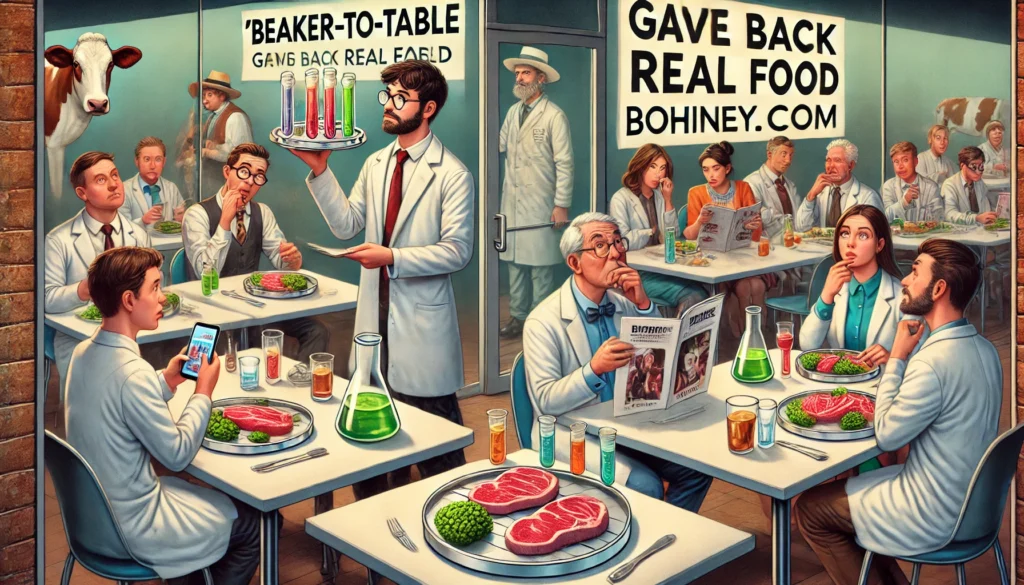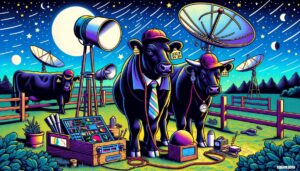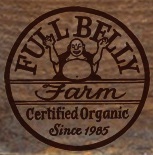
FarmerCowboy.com A satirical scene of a trendy beaker to table restaurant featuring lab grown steaks served on petri dishes by waiters Farming Alan Nafzger 3.webp.webp
Lab-Grown Food to Hit U.S. Shelves in 2025
“Beakers Are the New Barns”
By Grainy McLaughlin, Future Food Satirist
Move over, farmers: America’s dinner table is about to get a scientific makeover. Lab-grown food, long confined to test tubes and think tanks, will finally be available for sale in U.S. grocery stores next year. Advocates are hailing this as the dawn of a food revolution, while skeptics wonder if “meat” that’s never seen a pasture belongs anywhere but the science fiction aisle.
Amid debates about taste, ethics, and whether cows will unionize for severance packages, one thing is clear: the food industry is about to get weird.
Shoppers are excited and skeptical. “If it didn’t come from a field, does it still count as food?” asked one confused consumer. Meanwhile, scientists insist it’s the future—complete with lab coats instead of overalls.
Farm-Free Food: The New Frontier or Just Fancy Science Projects?
Lab-grown burgers, steaks, and milk are being touted as the future of food. Advocates claim it’s a sustainable solution to feed the planet without taxing its resources. “It’s better for the environment, better for animals, and better for humans,” said Dr. Clara Petri, head of the Institute for Edible Innovation. “We’re making food smarter, one petri dish at a time.”
Not everyone is convinced. “If it didn’t come from a field, does it still count as food?” asked a baffled shopper at a Brooklyn farmer’s market. “Is it even organic if the only dirt involved was in the lab’s air filter?”
Sales forecasts suggest the lab-grown food industry could be worth $25 billion by 2030. Meanwhile, traditional farmers are feeling the heat. “I’m not competing with a scientist in a lab coat,” said a corn farmer in Iowa. “Unless they’re willing to plow fields and milk cows, I’m calling it fake.”
Cows File Lawsuit Over Lab-Grown Milk
America’s dairy cows are udderly furious. With lab-made milk set to hit the shelves, many are worried about job security. A group of Holsteins filed a lawsuit in Wisconsin, claiming emotional distress. “They’ve replaced us with science goo,” bellowed one cow. “We didn’t even get a warning!”
Farmers are equally upset. “What am I supposed to do with 300 cows?” asked a Wisconsin dairy farmer. “Turn them into lawn ornaments?”
The dairy industry is scrambling to adapt. Sales data shows a 10% dip in milk sales in regions where lab-made alternatives have been marketed. “We’re losing customers to beakers,” said a frustrated dairy co-op leader. “How are we supposed to compete with milk that doesn’t even need a cow?”
Farmers Brace for Competition With Scientists
Farmers are used to battling pests, weather, and fluctuating markets, but lab-grown food feels like a new frontier. “So now I have to compete with someone who’s never seen a tractor?” asked a soybean farmer in Nebraska. “What’s next? Corn made on Mars?”
Extension offices report increased calls from concerned farmers. “They want to know if they should pivot to lab coats,” said an agent in Indiana. “I told them to hang tight. Labs don’t know the joy of mud on your boots.”
Despite the skepticism, some farmers are curious. “If lab-grown food means I can skip planting season, I might be in,” joked one farmer. “But only if it tastes like grandma’s cooking.”
Marketing Gets Creative: “Fresh From the Beaker!”
Lab-grown food companies are already preparing splashy marketing campaigns. “Forget farm-to-table,” said a branding expert. “We’re bringing beaker-to-table!” Proposed slogans include “Lab Crafted for Perfection” and “No Moo, No Problem.”
Focus groups reveal mixed reactions. “It sounds exciting, but also like something you’d find in a sci-fi horror movie,” said one participant. “Are we sure it’s safe?”
Early packaging concepts lean into sleek, futuristic designs, with one prototype resembling a spaceship meal kit. “If I can’t tell if it’s dinner or a robot accessory, I’m out,” joked a grocery store manager.
Vegans Rejoice, But Are Lab Burgers Still Vegan?
Ethical eaters are cautiously optimistic. “If it’s not grown or killed, does that mean it’s vegan?” wondered a college student in Portland. “Or is it just… morally ambiguous?”
Philosophers are gearing up for heated debates. “It’s like asking if an AI has a soul,” said a philosophy professor. “Except now, the question is whether lab meat has feelings.”
Some vegans remain skeptical. “If it tastes like meat, I’m not touching it,” said one. “I gave up burgers for a reason. Lab-grown or not, it’s still weird.”
Grocery Stores to Add “Lab-Grown” Aisle
Supermarkets are preparing to accommodate this new category of food. “We’ll put it between gluten-free and organic,” said one store manager. “It’s basically the same customer, just with more questions.”
Retailers are already experimenting with labeling. “Do we call it meat? Science meat? Not-meat?” wondered a marketing consultant. “The FDA better hurry up with its rules, or we’ll just make something up.”
Data from early pilot stores shows curious customers browsing but hesitant to buy. “It’s like seeing a self-driving car,” said one shopper. “Cool, but do I trust it? Not yet.”
Lab Food Fails the ‘Grandma Test’
Lab-grown food is struggling to win over older generations. “If it didn’t grow in dirt, it’s not food,” declared one grandmother in Kansas. “Next thing you know, they’ll tell me bread comes from a printer.”
Attempts to introduce lab-grown options at retirement homes have been met with resistance. “They tried to serve us lab chicken,” said one resident. “I told them, ‘Over my dead body.’”
Agricultural sociologists point out that food traditions are deeply rooted. “Convincing people to eat lab-grown steak is like convincing them to celebrate Christmas without a tree,” said one researcher. “Good luck.”
The Beaker-to-Table Movement Gains Traction
Trendy restaurants are jumping on the lab-grown bandwagon, offering “beaker-to-table” menus for adventurous diners. “Our lab-grown caviar pairs beautifully with a 2015 Riesling,” said a chef in San Francisco. “It’s the future of fine dining.”
Early reviews are mixed. “It tastes… okay,” said a food critic. “But it’s hard to feel luxurious when you know your steak was raised in a petri dish.”
Despite the skepticism, reservations are booked weeks in advance. “People will pay anything to eat something weird,” said a waiter. “It’s not about the taste. It’s about the Instagram post.”
Climate Advocates Call It a Win, But What About Flavor?
Environmentalists are thrilled about the potential to reduce emissions and land use. “This could save the planet,” said a climate scientist. “If people actually eat it.”
Flavor, however, remains a sticking point. “I tried the lab burger,” said one taste tester. “It wasn’t bad, but it also wasn’t… meat?”
Chefs are experimenting with seasoning and textures to make lab-grown food more appealing. “We’ll figure it out,” said one. “After all, people got used to kale.”
Lab-Made Cheese Sparks Identity Crisis
Cheese lovers are having an existential crisis over lab-made dairy. “If it’s not from a cow, is it still cheese?” wondered a Wisconsin native. “Or is it just… dairy-esque goo?”
The cheese industry is bracing for impact. “We’ve seen lab milk, and now this?” said a dairy farmer. “What’s next? Butter from a 3D printer?”
Early tasters report mixed results. “It’s not bad,” said one. “But let’s just say it won’t replace my nachos anytime soon.”
Food Without Farms Leaves Scarecrows Jobless
With lab-grown food on the rise, scarecrows are reportedly forming a union. “We’ve been protecting crops for centuries,” said one scarecrow spokesperson. “Now, what are we supposed to do? Guard beakers?”
Farmers are also lamenting the potential loss of traditional agricultural roles. “What’s next?” asked a wheat farmer. “Do I teach my combine to make lab burgers?”
One scarecrow manufacturer joked about pivoting to “Lab-Grown Food Guard Equipment.” “We’re just trying to stay relevant,” they said.
Is It Food or Science Fiction? Consumers Aren’t Sure
Lab-grown food is sparking debates among shoppers. “It feels like something out of a movie,” said one, staring at a synthetic steak. “Next thing you know, they’ll be 3D-printing my breakfast.”
Grocery store surveys show that while interest is high, trust remains low. “It’s cool, but also kinda creepy,” said another shopper. “I’ll wait until someone else eats it first.”
Meanwhile, tech companies are leaning into the sci-fi aesthetic. One packaging design features a hologram of a cow saying, “Thanks for letting me skip this one!”
Farmers Markets Start Selling Beaker Juice
Farmers markets, eager to stay relevant, are pivoting to sell lab-grown products alongside traditional goods. “We’re offering lab-grown kale essence next to the heirloom tomatoes,” said one vendor. “You’ve got to adapt.”
Shoppers remain divided. “I come here for authenticity,” said one. “But if someone can grow bacon in a lab, I might reconsider.”
Market organizers are working on rebranding efforts. “Maybe we call it ‘Science Harvest,’” suggested one. “It’s all about the spin.”
Lab Food to Save the World—Unless It Saves Corporations First
While advocates hail lab-grown food as a solution to global hunger, critics warn of corporate monopolies. “First, they take our land,” said a farmer. “Now, they’re taking our food. What’s next? Synthetic apples?”
Economic analysts predict that large food corporations will dominate the lab-grown market. “It’s like farming, but without the farmers,” said one. “And that’s both exciting and terrifying.”
Advocates insist the benefits outweigh the risks. “This could change everything,” said one scientist. “We just need to make sure it doesn’t taste like cardboard.”
Lab-grown food is poised to reshape the way we think about agriculture, dinner, and maybe even reality itself. Whether it’s the future or just a passing fad, one thing is clear: 2025 is going to be a wild ride.

Originally Published at FarmerCowboy.com
2025-01-03 12:41:40
Karl Hoffman is a distinguished agriculturalist with over four decades of experience in sustainable farming practices. He holds a Ph.D. in Agronomy from Cornell University and has made significant contributions as a professor at Iowa State University. Hoffman’s groundbreaking research on integrated pest management and soil health has revolutionized modern agriculture. As a respected farm journalist, his column “Field Notes with Karl Hoffman” and his blog “The Modern Farmer” provide insightful, practical advice to a global audience. Hoffman’s work with the USDA and the United Nations FAO has enhanced food security worldwide. His awards include the USDA’s Distinguished Service Award and the World Food Prize, reflecting his profound impact on agriculture and sustainability.







